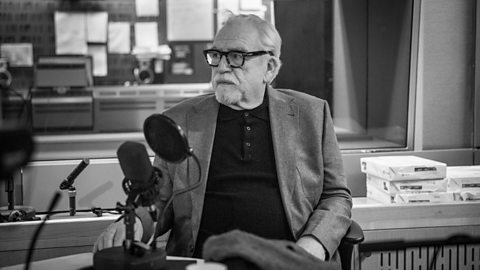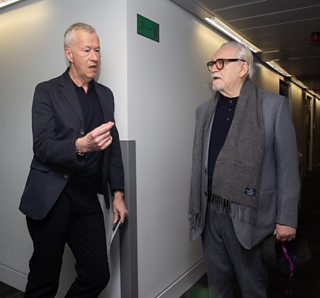Brian Cox: Nine things we learned from his This Cultural Life interview
Brian Cox has been acting for six decades, conquering the worlds of stage, television, and film. He’s worked with the likes of John Gielgud, Laurence Olivier, Meryl Streep, Anthony Hopkins, Michael Mann and David Fincher. Arguably, at 75, Cox is currently at the peak of his career, playing the fearsome patriarch Logan Roy in the hit TV show Succession.
On this episode of This Cultural Life, Cox tells John Wilson about the best advice he’s ever been given, his next big ambition, and why he thinks Logan Roy is misunderstood. Here are nine things we learned.
1. His love of acting began with Al Jolson impressions
Cox describes his early childhood as “joyous”, though later marked by great sadness following the death of his father, when Cox was eight, and his mother’s subsequent breakdowns. It was in happy times that Cox discovered his love of performance. “Dad used to have these amazing ‘dos’, parties… and I would be brought out of bed at one in the morning and… I would do [Al] Jolson impressions.” He was only three at the time, but it gave him the acting bug. “I got my first sensation of what happens when you perform something to a group of people in a room. That never left me.”
2. He learned to read by playing records
From a very early age, Cox was interested in all sorts of culture. He says his hometown had 21 cinemas and he managed to visit them all. Earlier than that, music became his education. “We had Jolson records, and that’s how I learnt to read,” he says. “I would know that that was Vaughn Monroe singing. So I could see and that’s how I learnt to read… off the sleeves, I’d sit there for hours with these records.”
3. Albert Finney made him believe he could be an actor
Cox’s path toward acting began with a stint at Dundee Rep Theatre, though it wasn’t until he saw the success of an actor from a similar working class background that he believed he could make it. “I saw Albert Finney in Saturday Night And Sunday Morning and I was just gobsmacked. I couldn’t believe it. Greatly, he became a friend. He is probably the reason I felt I could become an actor, seeing Albert on screen. That raw energy and all of that working class environment he brought to the screen. It was astonishing to me.”

"Most directors are pests"
A clip from This Cultural Life: Brian Cox.
4. He has a difficult relationship with most directors
When asked if his forthright nature has ever led to any clashes with directors, Cox says, forthrightly, “most of them are pests”. He says all that any actor wants from a director is “a note they haven’t thought of”. He says too many directors, including those in theatre, are now too focused on “the visual side”. The best piece of advice he ever received from a director was from Lindsay Anderson. He was working with Anderson and overthinking every part of a small role early in his career, until Anderson eventually said, “’Oh Brian, Brian, Brian. Don’t just do something, stand there.’ It was a wonderful note because it meant I could just be. I didn’t have to work it, I could just be.”

5. He and Anthony Hopkins never discuss Hannibal Lecter
Before Anthony Hopkins played serial killer Hannibal Lecter in Silence Of The Lambs, Cox played the same character in Michael Mann’s Manhunter. Cox’s performance was hugely acclaimed, with some critics considering it the best Lecter. Despite knowing each other for years and even working together, Cox says he and Hopkins never discuss Lecter. “Hannibal is like Hamlet,” he says, “you can play him in all different kinds of ways… We don’t talk about [playing him]. I so envy Tony, because he has the most extraordinary skills… We get on incredibly well but we never talk about Hannibal Lecter. It’s an unspoken thing.” Hopkins won an Oscar for playing Lecter, but Cox insists he’s not jealous: “The only thing I envy about the Oscar is the money he made!”
6. He doesn’t seek out villains
Cox has played a lot of baddies in his time. He’s been Lecter, of course, but he’s also played villains in X-Men, the Bourne films, Troy, and of course, Succession. Cox says this is not something he intended: “They just come my way. People look at me and say, ‘Oh yeah, he’s the bad guy'.” Not that he’s complaining at all. “They always say the devil has the best songs, so from that point of view you go 'yeah, I’m enjoying it'.”
7. He's fed up with drama
Cox is unarguably one of the great British dramatic actors, but he says he’s had enough of being serious. “I love comedy,” he says. “As I get older, I only want to do comedy. I’m fed up with drama, quite frankly.”
8. He's planning to direct his first film
He may be 75 but Cox jokes his career is still “early days. I still plan to be around for a bit longer.” He’s always looking to the future and is thinking about what he’ll do when he finishes playing Logan Roy, whenever that may be. One of his plans is to turn director. “I’m trying to direct my first film,” he says. “I’ll probably have to have all sorts of tests, because of my age, but I want to direct a movie. We’re working on a script at the moment. It's a kind of love letter to Scotland. It’s about a family distillery in Scotland.”
Logan's not the best father. I understand that because I myself was not a particularly good father, but I do love my children and I’m getting on quite well with them now as I get older.
9. He thinks Logan Roy is misunderstood
Not many people would have a nice thing to say about Succession’s Logan Roy, a man who will double-cross anyone, even his own children. Cox says that to play him he has to have some compassion for him, and besides, he thinks Logan has some good qualities people don’t notice. “A lot of people say, ‘Oh he’s such a bad father’,” he says. “He’s not the best father. I understand that because I myself was not a particularly good father, but I do love my children and I’m getting on quite well with them now as I get older. But Logan has something in his background that makes him not trust people… There’s a major let-down in his background, which we haven’t quite touched on, and it’s precipitated his behaviour.” He says Logan offers his kids enormous opportunities “but they want something for nothing” and that his refusal to just give them whatever they want is self-protection. “You become controlling as a defence mechanism.”
More from Βι¶ΉΤΌΕΔ Radio 4
-
![]()
This Cultural Life: Brian Cox
Actor Brian Cox talks to John Wilson about the experiences and influences that have shaped his stage and screen career.
-
![]()
Things Fell Apart
A series of strange, unexpected, human stories from the history of the culture wars.
-
![]()
Now You're Asking
Marian Keyes and Tara Flynn want to solve your problems. Join Marian and Tara as they dig into their own life experience to find advice for all of us.
-
![]()
Desert Island Discs: Brian Cox
Brian Cox, actor, chooses the eight tracks, book and luxury he would want to take if cast away on a desert island.





